

The Beacon: The Blog of The Independent Institute. Piketty’s Capital: I.
The Tyranny of Experts: Economists, Dictators, and the Forgotten Rights of the Poor. This Philanthropist Is Winning Skirmishes With Poverty By Tapping Into An Inner City’s Entrepreneurial Spirit. Much has been written about social entrepreneurship; ventures in which an explicit goal is the betterment of society.
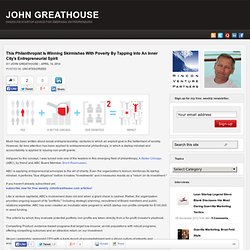
Worse Than Death Panels: Cookbook Medicine - John C. Goodman - Page full. People who worry about death panels are missing the forests for the trees.

Yes, people with expensive-to-treat conditions may someday be denied life-saving treatment because of ObamaCare. But there is a far greater danger for ordinary mortals: government and its health insurance proxies telling doctors how to practice medicine. In treating patients with various symptoms, doctors are increasingly pressured to follow guidelines or protocols. Word Wenches: Horse troughs. Joanna here, looking into two-hu ndred-year-old animal welfare issues.

London, up till this last hundred years or so, was just plumb full of horses -- horses being ridden, horses pulling carts and wagons, horses pulling carriages. So I got to thinking about how these thousands of Regency horses got water to drink, London not being full of little trickling streams and all. The answer, of course, is horse troughs. These were a private enterprise in 1800, rather than a municipal concern. The 'Unlikely' Social-Cause Startup Attracting Young Hollywood. Yunus Centre. Help on wheels. ATLANTA—Razor wire tops the fence that encircles the industrial building that houses the Beltline Bike Shop.
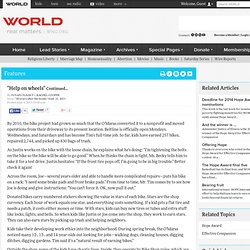
Only a small yellow sign signals the shop’s existence on the edge of the Adair Park neighborhood in southwest Atlanta. Inside, though, the vibe is vibrant. A small screen plays bike videos to a rap accompaniment. The Author - Peter Van Buren. Peter Van Buren, a 24-year veteran of the State Department, spent a year in Iraq.
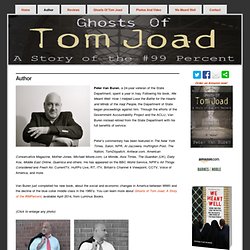
Following his book, We Meant Well: How I Helped Lose the Battle for the Hearts and Minds of the Iraqi People, the Department of State began proceedings against him. This is real law #thisisreallaw. Reinventing Philanthropy: A Framework for More Effective Giving: Eric Friedman: 9781612345727: Amazon.com. Alleviating Global Poverty Is a Top Concern of Wealthy Donors, Says Study - Donors. By Maria Di Mento The world’s wealthiest philanthropists say the main goal of their giving is to alleviate global poverty, and the best way to do that, they say, is through greater collaboration between charities and other organizations, according to a study released today.
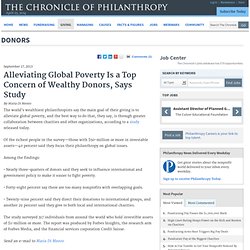
Of the richest people in the survey—those with $50-million or more in investable assets—40 percent said they focus their philanthropy on global issues. Among the findings: • Nearly three-quarters of donors said they seek to influence international and government policy to make it easier to fight poverty. • Forty-eight percent say there are too many nonprofits with overlapping goals. • Twenty-nine percent said they direct their donations to international groups, and another 29 percent said they give to both local and international charities. Social Services. Poverty Is No Longer a Priority for Nonprofits - Pablo Eisenberg. By Pablo Eisenberg In the last decade or so, nonprofits have stopped caring about the plight of the poor.
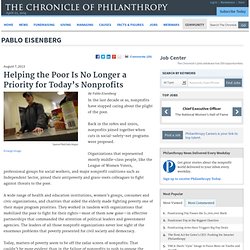
Back in the 1980s and 1990s, nonprofits joined together when cuts in social-safety-net programs were proposed. Organizations that represented mostly middle-class people, like the League of Women Voters, professional groups for social workers, and major nonprofit coalitions such as Independent Sector, joined their antipoverty and grass-roots colleagues to fight against threats to the poor. A wide range of health and education institutions, women’s groups, consumer and civic organizations, and charities that aided the elderly made fighting poverty one of their major program priorities. Depts.washington.edu/wcpc/sites/default/files/papers/Allard%2520WCPC%2520Conference%2520Paper%25208-25-08_0.pdf. Welfare Statistics. Welfare-to-Work Program Benefits and Costs. Study: More Than Half a Trillion Dollars Spent on Welfare But Poverty Levels Unaffected. (AP Photo/J Pat Carter, File) (CNSNews.com) – The federal government is not making much headway reducing poverty despite spending hundreds of billions of dollars, according to a study by the libertarian Cato Institute.
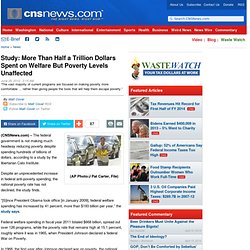
Despite an unprecedented increase in federal anti-poverty spending, the national poverty rate has not declined, the study finds. “[S]ince President Obama took office [in January 2009], federal welfare spending has increased by 41 percent, more than $193 billion per year,” the study says. Federal welfare spending in fiscal year 2011 totaled $668 billion, spread out over 126 programs, while the poverty rate that remains high at 15.1 percent, roughly where it was in 1965, when President Johnson declared a federal War on Poverty.
In 1966, the first year after Johnson declared war on poverty, the national poverty rate was 14.7 percent, according to Census Bureau figures. In fiscal year 2008, anti-poverty spending was $475 billion. We Spend HOW MUCH On Welfare? While researching another blog post, I came across an article that truly shocked me - which is really hard to do, given my familiarity with the Obama administration's free-spending ways.

Over $60,000 in Welfare Spent Per Household in Poverty New data compiled by the Republican side of the Senate Budget Committee shows that, last year, the United States government spent over $60,000 to support welfare programs per each household that is in poverty. Think by Numbers » Government Spends More on Corporate Welfare Subsidies than Social Welfare Programs. Time Magazine, Vol. 152 No. 19 About $59 billion is spent on traditional social welfare programs. $92 billion is spent on corporate subsidies. So, the government spent 50% more on corporate welfare than it did on food stamps and housing assistance in 2006. Before we look at the details, a heartfelt plea from the Save the CEO’s Charitable Trust: There’s so much suffering in the world. It can all get pretty overwhelming sometimes. How Much Do We Spend on the Nonworking Poor? Charts of Current Spending - UsGovernmentSpending.com. In fiscal year 2014 the governments in the United States are expected to spend about 36 percent of Gross Domestic Product.
Most of the money goes for health care, education, pensions, defense, and welfare programs. Health care spending is split mainly between federal and state governments; education spending is mainly spent by local governments; pension spending is primarily the federal government’s Social Security program. Government Spending: Federal, State, Local Governments in the US will spend $6.3 trillion in 2014. Table 2.01: Total Spending in 2014 In fiscal 2014 the federal government estimates spending will be $3.7 trillion, of which $0.6 trillion will be transferred to states and local governments.
Total spending at all levels of government in the United States is "guesstimated" by usgovernmentspending.com to be $6.3 trillion in 2014. Govt spent $1.028 trillion on welfare in FY 2011. The government spent approximately $1.03 trillion on 83 means-tested federal welfare programs in fiscal year 2011 alone — a price tag that makes welfare that year the government’s largest expenditure, according to new data released by the Republican side of the Senate Budget Committee. The total sum taxpayers spent on federal welfare programs was derived from a new Congressional Research Service (CRS) report on federal welfare spending — which topped out at $745.84 billion for fiscal year 2011 — combined with an analysis from the Republican Senate Budget Committee staff of state spending on federal welfare programs (based on “The Oxford Handbook of State and Local Government Finance”), which reached $282.7 billion in fiscal year 2011.
Policy Basics: Where Do Our Federal Tax Dollars Go? The federal government collects taxes to finance various public services. As policymakers and citizens weigh key decisions about revenues and expenditures, it is instructive to examine what the government does with the money it collects. In fiscal year 2013, the federal government spent $3.5 trillion, amounting to 21 percent of the nation’s Gross Domestic Product, or the total value of goods and services that a country produces in a year. Does the federal government spend more on ‘welfare’ than anything else? Unintended Consequences by Thomas Sowell on Creators. Entitlement Rip-Off by John Stossel on Creators. Bernie Madoff took money from people who thought he'd invested it, gave some to others who thought it was a partial return on their earlier investments and kept much for himself. Bill Gates Needs an Econ Course by John Stossel on Creators.
Dropping out of college didn't stop Bill Gates from making tons of money, but it kept him from classes where he might have learned about the beauty of spontaneous market processes. Never mind. How the State Destroys Social Cooperation - Gary Galles. Many of our present economic difficulties, while blamed by politicians on freedom and markets, are in fact the long-run effects of government policies emphasizing short-run, visible benefits that mask hidden or delayed costs.
Welfare and work: Taxing hard-up Americans at 95% Welfare and work: Taxing hard-up Americans at 95% Libertarian thinking on the events of the day. The teachers' strike in Chicago: Fighting irrelevance with fire. August 2013. Doing things together doesn't mean a big-government program. Consider the reactions to catchphrases made famous by Barack Obama and Hillary Clinton — "You didn't build that" and "It takes a village. " Obama's 2012 message to business founders, "You didn't build that; somebody else made that happen," shaped the Republican counterattack in Summer 2012. From Callous to Caring: The Key to Jewish Compassion. I never thought of myself as a callous person, and yet, I can’t deny that there were times when I was just too “busy” to stop and treat certain situations with the importance they deserved. 2013 Hope Award. WORLD News Group is pleased to announce that the winner of the 2013 Hope Award for Effective Compassion is Administer Justice in Elgin and Geneva, Ill.
Philosophy.